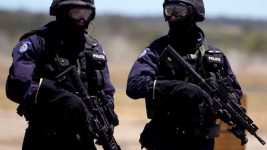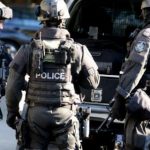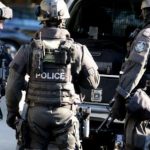NSW Police Given Power to Kill with Impunity

The Berejiklian government has continued on in the Coalition’s tradition over recent years of enacting laws that increase police powers, whilst whittling away at civil liberties, all in the name of a perceived terrorist threat.
On June 21, the Terrorism Legislation Amendment (Police Powers and Parole) Bill 2017 was rushed through state parliament with bipartisan support. The bill grants NSW police the power to shoot-to-kill without fear of prosecution, as well as placing further restrictions on parole.
The only party to oppose the legislation as it went through parliament was the NSW Greens.
The amendments were in response to the coronial findings into the 2014 Lindt Café siege, which were handed down in May.
The State Coroner’s report outlined that two snipers hesitated shooting gunman Man Haron Monis when they had a clear shot. The officers did so as they weren’t sure “whether they had lawful justification to use lethal force.”
Legislating to shoot-to-kill
The new bill makes amendments to the Terrorism (Police Powers) Act 2002. It provides that if the police commissioner has declared an incident a terrorist act, then officers responding to that incident are permitted to use lethal force when they deem it “reasonably necessary.”
The legislation outlines that this can be done in order to defend a threatened person, but also to “prevent or terminate” a person’s “unlawful deprivation of liberty.” So it appears an officer can shoot-to-kill someone who’s not posing an imminent threat to others.
And if an officer does apply lethal force in these circumstances, they don’t “incur any criminal liability for taking” such an action. President of the NSW Law Society Pauline Wright said in a statement that the bill seemed to authorise the use of lethal force on a citizen without sufficient justification.
Vague powers to kill with immunity
A major criticism of the legislation is that the wording is ambiguous. NSW Greens MLC David Shoebridge said an “obvious danger” is that the bill “allows police to apply lethal force not just to the alleged terrorist, but to anybody at the incident,” be that “hostages, third parties or bystanders.”
Indeed, the bill makes no clear definition of who police can apply lethal force to. “The legislation was very poorly drafted and erred on the side of excessive police powers,” Mr Shoebridge told Sydney Criminal Lawyers®, “rather than protecting centuries-old liberal traditions.”
Mr Shoebridge also questioned the extraordinary “criminal immunity” provided to police in these circumstances. He sees this bill as part of a continuing trend of recent legislation “that increases police powers and expands police discretion.”
And not only was NSW police extended poorly defined shoot-to-kill powers, but those in parliament were given no time to review them. The bill that “parliamentarians hadn’t read… entered and exited parliament within less than one business day,” Shoebridge continued.
Recommended by the coroner?
The legislation states that the amendments to police powers “seek to clarify the use of force as recommended by” the Lindt Café siege report. And recommendation 24 of the report does state that the Terrorism Act should be amended to ensure police have “sufficient legal protection.”
According to Mr Shoebridge, the amendments that were made had nothing to do with what the report was actually recommending. He said the coroner found that police already had the power to apply lethal force “under existing Common law to protect life and liberty.”
The report also found that the officers hesitated because of the way they’d been trained. “But instead of improving police training this government just extended police powers,” Shoebridge said.
And the report in no way recommended immunity to officers who apply lethal force. The coroner outlined that “the existing legal framework” was an “appropriate safeguard against unnecessary force being used,” while ensuring an officer is excused when they use severe force.
The current framework being “the coroner, the Director of Public Prosecutions and, if it gets that far, a jury,” the coroner outlined.
A denial of parole
The current bill also makes amendments to the Crimes (Administration of Sentences) Act 1999. The changes provide that terrorist-related offenders are not to be released on parole, unless the parole board is satisfied the offender will not engage in or incite terrorist activities.
Prime minister Malcolm Turnbull proposed the presumption against granting bail law at a COAG meeting on June 9. In doing so, he gained the support of all state and territory governments.
The legislation defines the offenders that this measure applies to are those serving a sentence for a terrorism offence, individuals, who have an association with or have stated support for terrorists groups, as well as those who have associations or affiliations with people advocating support for terrorists.
As the parole restrictions apply to individuals who merely associate with people who support terrorism, it seems the new parole conditions could be used against family members, friends or even acquaintances of terrorists.
Undermining parole
President of the NSW Council for Civil Liberties Stephen Blanks pointed out that “the purpose of parole is to integrate people who are under sentence of imprisonment back into society.” This mechanism ensures that people “are not released cold at the end of their prison term into society without supervision.”
The new amendments “will undermine the ability of the parole system to perform that important function,” Mr Blanks told Sydney Criminal Lawyers®. And he added that parole works to keep the community safe, along with ensuring, “as much as possible,” that people don’t reoffend.
The PM is recommending that terrorist-related offenders and their associates not be released into the community under the supervision of parole conditions, due to the security threat they pose. However, when their full sentence is up, they’ll be left to be released without any oversight.
Applying lethal force to ideology
On the use of lethal force provisions, Mr Blanks explained that the amendments change the reasoning as to why an officer can shoot-to-kill. “Instead of serious risk to life being the criteria for police being able to use lethal force, the criteria becomes the ideological motivation of the offender.”
NSW police officers now have the power to shoot-to-kill if they suspect a person follows radicalised Islam. “The danger with this kind of legislation is that once one state does it, then the others will just copy it without thinking,” Mr Blanks warned.
One step closer to a police state
A swag of laws and measures have been put in place over the last ten years that have eaten away at civil liberties in NSW, while further expanding the powers of police.
The NSW consorting laws were enacted in 2012. Under section 93X of the NSW Crimes Act 1900, a person – whether or not they have a criminal record – can be warned by police, either verbally or in writing, not to communicate with those who’ve previously been convicted of a crime.
The Serious Crime Prevention Orders Bill was passed on May 4 last year. It allows courts to issue directives restricting aspects of a person’s life, including employment, movement and association. These orders can be issued without proof that an individual has committed a crime.
And in a move that makes one question why the new amendments had to be enacted. NSW police adopted a shoot first policy to respond to the threat of domestic terrorism in November 2015. It allows police to shoot a person they merely suspect is an armed terrorist on sight.
Applying lethal force to hackers
And in a rather bizarre twist, Mr Shoebridge pointed out that because the shoot-to-kill provisions apply to the broad definition of a terrorist incident, NSW police now have the power to use lethal force when dealing with incidents involving “interference with telecommunications and online data services.”
“Why did we grant that power?” Mr Shoebridge questioned. “I would say because most people in parliament didn’t know what they were doing, because they hadn’t read the legislation.”








